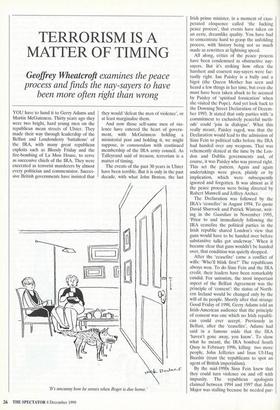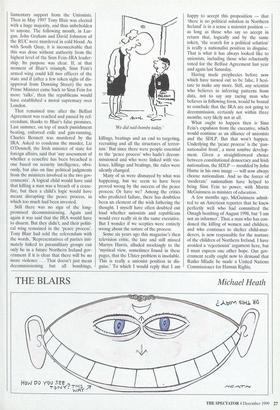TERRORISM IS A MATTER OF TIMING
Geoffrey Wheatcroft examines the peace process and finds the nay-sayers to have been more often right than wrong
YOU have to hand it to Gerry Adams and Martin McGuinness, Thirty years ago they were two bright, hard young men on the republican mean streets of Ulster. They made their way through leadership of the Belfast and Londonderry 'battalions' of the IRA, with many great republican exploits such as Bloody Friday and the fire-bombing of La Mon House, to serve as successive chiefs of the IRA. They were execrated as terrorist murderers by almost every politician and commentator. Succes- sive British governments have insisted that they would 'defeat the men of violence', or at least marginalise them.
And now those self-same men of vio- lence have entered the heart of govern- ment, with McGuinness holding a ministerial post and holding it, we might suppose, in commendam with continued membership of the IRA army council. As Talleyrand said of treason, terrorism is a matter of timing.
The events of the past 30 years in Ulster have been terrible. But it is only in the past decade, with what John Bruton, the last 71's uncanny how he senses when Roger is due home.' Irish prime minister, in a moment of exas- perated eloquence called 'the fucking peace process', that events have taken on an eerie, dreamlike quality. You have had to concentrate hard to grasp the unfolding process, with history being not so much made as rewritten at lightning speed.
All along, critics of the peace process have been condemned as obstructive nay- sayers. But it's striking how often the harshest and coarsest nay-sayers were fac- tually right. Ian Paisley is a bully and a bigot (the Queen Mother has seen and heard a few things in her time, but even she must have been taken aback to be accused by Paisley of 'spiritual fornication' when she visited the Pope). And yet look back to the Downing Street Declaration of Decem- ber 1993. It stated that only parties with 'a commitment to exclusively peaceful meth- ods' could 'join in dialogue'. What this really meant, Paisley raged, was that the Declaration would lead to the admission of Sinn Fein to political talks before the IRA had handed over any weapons. That was vehemently denied at the time by the Lon- don and Dublin governments and, of course, it was Paisley who was proved right. This set the pattern. Again and again undertakings were given, plainly or by implication, which were subsequently ignored and forgotten. It was almost as if the peace process were being directed by Robert Maxwell and Jeffrey Archer.
The Declaration was followed by the IRA's 'ceasefire' in August 1994. To quote David Sharrock and Patrick Wintour, writ- ing in the Guardian in November 1995, 'Prior to and immediately following the IRA ceasefire the political parties in the Irish republic shared London's view that guns would have to be handed over before substantive talks got underway.' When it became clear that guns wouldn't be handed over, that condition was quietly dropped.
After the 'ceasefire' came a conflict of wills: 'Who'll blink first?' The republicans always won. To do Sinn Fein and the IRA credit, their leaders have been remarkably candid. For unionists, the most important aspect of the Belfast Agreement was the principle of 'consent': the status of North- ern Ireland would be changed only by the will of its people. Shortly after that strange Good Friday of 1998, Gerry Adams told an Irish-American audience that the principle of consent was one which no Irish republi- can could ever accept. Previously in Belfast, after the 'ceasefire', Adams had said in a famous aside that the IRA 'haven't gone away, you know'. To show what he meant, the IRA bombed South Quay in February 1996, killing two more people, John Jefferies and Inan Ul-Haq Baashir (trust the republicans to spot an agent of British imperialism).
By the mid-1990s Sinn Fein knew that they could turn violence on and off with impunity. The republican apologists claimed between 1994 and 1997 that John Major was stalling because he needed par- liamentary support from the Unionists. Then in May 1997 Tony Blair was elected with a huge majority, and thus unbeholden to anyone. The following month, in Lur- gan, John Graham and David Johnston of the RUC were murdered in cold blood. As with South Quay, it is inconceivable that this was done without authority from the highest level of the Sinn Fein–IRA leader- ship. Its purpose was clear. If, at that moment of Blair's triumph, Sinn Fein's armed wing could kill two officers of the state and if (after a few token sighs of dis- approval from Downing Street) the new Prime Minister came back to Sinn Fein for more 'talks', then the republicans would have established a moral supremacy over London.
That remained true after the Belfast Agreement was reached and passed by ref- erendum, thanks to Blair's false promises. Last summer, on top of much punishment beating, enforced exile and gun-running, Charles Bennett was murdered by the IRA. Asked to condemn the murder, Liz O'Donnell, the Irish minister of state for foreign affairs, said that 'any assessment of whether a ceasefire has been breached is one based on security intelligence, obvi- ously, but also on fine political judgments from the ministers involved in the two gov- ernments'. A logical child would have said that killing a man was a breach of a cease- fire, but then a child's logic would have meant disrupting the peace process, in which too much had been invested.
Still there was no sign of the long- promised decommissioning. Again and again it was said that the IRA would have to disarm. But they didn't, and their politi- cal wing remained in the 'peace process'. Tony Blair had sold the referendum with the words, 'Representatives of parties inti- mately linked to paramilitary groups can only be in a future Northern Ireland gov- ernment if it is clear that there will be no more violence ... That doesn't just mean decommissioning but all bombings, 'We did nail-bombs today.'
killings, beatings and an end to targeting, recruiting and all the structures of terror- ism.' But since there were people essential to the 'peace process' who hadn't decom- missioned and who were linked with vio- lence, killings and beatings, the rules were silently changed.
Many of us were dismayed by what was happening, but we seem to have been proved wrong by the success of the peace process. Or have we? Among the critics who predicted failure, there has doubtless been an element of the wish fathering the thought. I myself have often doubted out loud whether unionists and republicans would ever really sit in the same executive. But I wonder if we sceptics were entirely wrong about the nature of the process.
Some six years ago this magazine's then television critic, the late and still missed Martyn Harris, alluded mockingly to the `mystical view, sometimes found in these pages, that the Ulster problem is insoluble. 'This is really a unionist position in dis- guise.' To which I would reply that I am happy to accept this proposition — that `there is no political solution in Northern Ireland' is in a sense a unionist position as long as those who say so accept in return that, logically and by the same token, 'the search for a political solution' is really a nationalist position in disguise. That is what it has always looked like to unionists, including those who reluctantly voted for the Belfast Agreement last year and again last Saturday.
Having made prophecies before now which have turned out to be false, I hesi- tate to make any more. Still, any scientist who believes in inferring patterns from data, not to say any racing man who believes in following form, would be bound to conclude that the IRA are not going to decommission, certainly not within three months, very likely not at all.
What ought to happen then is Sinn Fein's expulsion from the executive, which would continue as an alliance of unionists and the SDLP. But that won't happen. Underlying the 'peace process' is the 'pan- nationalist front', a most sombre develop- ment. Given a straightforward choice between constitutional democracy and Irish nationalism, the SDLP — moulded by John Hume in his own image — will now always choose nationalism. And so the forces of `moderate' nationalism have helped to bring Sinn Fein to power, with Martin McGuinness as minister of education.
A few months ago, McGuinness admit- ted to an American reporter that he knew perfectly well who had committed the Omagh bombing of August 1998, but 'I am not an informer'. Thus a man who has con- doned the killing of women and children, and who continues to shelter child-mur- derers, is now responsible for the nurture of the children of Northern Ireland. I have avoided a `rejectionise argument here, but I must express one other hope. Our gov- ernment really ought now to demand that Ratko Mladic be made a United Nations Commissioner for Human Rights.



















































































 Previous page
Previous page